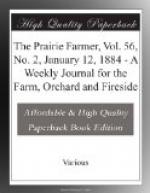—Edward Renaud.
YIK KEE.
After father died some ten years ago, I found, that for three years we had been living on credit. I was eighteen, strong and well, but did not know how to work. In the little back room of the New York tenement house (by the way, the landlady seized my clothes for our rent) I considered my future. I had inherited a great faith in relatives, from my father, so I wrote to seven. I received six polite notes, telling me to go to work, and the following letter:
JONESBORO, COLORADO—JACKSON’S RANCH.
Dear Nell.—I’m your cousin Jack. Your father once give me money to come out West. I’ve took up land, got a comfortable home, no style or frills, but good folks to live with and healthy grub. I’ve got the best wife you ever see and seven fine youngsters. The city ain’t no place for a friendless girl. Wife wants you to come. She’ll be a mother to you. Come right off. I’ll meet you at Denver.
Jack.
Inclosed was a check sufficient to defray expenses; so I started. Denver was then only a large town and the depot a barn-like structure. I got out of the cars and stood bewildered among all the emigrants and their bundles. Some one touched me on the shoulder—a roughly-dressed, broad-shouldered man with long, blonde beard and big blue eyes.
“Are you Nell?” he said.
“Yes; and you’re Cousin Jack.”
“I knew you,” he said, as he led the way, “by your black clothes an’ sorrerful look, an’ them big blue eyes, like yer father’s as two peas. We’ll git the shader outer ’em when we get home. Yer father was a mighty good man. Bless yer dear heart, don’t let them tears come. This ’ere’s a dry country, we don’t waste no water.”
Comforting me in his kind, rough way, he reached his team, a big green wagon, drawn by two wild-looking steeds which I afterward knew to be bronchos. A fat, blonde boy, about twelve, held the reins.
“That’s Ted,” said Cousin Jack. “Ted, this is Miss Nell, yer cousin; give her a hug.” The fat boy solemnly obeyed.
After this he seemed to have a special claim on my affections because he met me first. Jack’s wife was a jolly, plump woman, with brown eyes and curly hair. She always had a baby in her arms and another at her heels. She adored Jack. I never knew them to have a quarrel. I soon grew to love the life at the ranch. I liked the big, half-finished house, its untidyness and comfort—its pleasant, healthy atmosphere. I loved the children, the household pets—Shep, the sagacious dog; Thad, the clever cat; the hens and sheep; the horses Dolly, Dot, and Daisy, that did the plowing, and the marketing at Denver, twelve miles away, and were so gentle and kind we used to ride them without saddle or bridle. I learned that cattle grew fat on the dry-looking grass and gave the best of milk.




